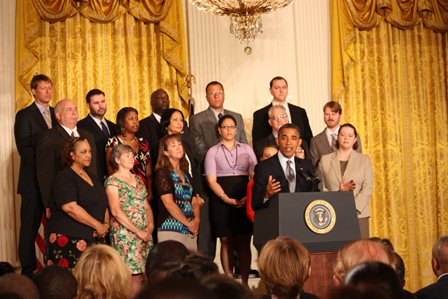 Charlotte, North Carolina (CNN) -- President Obama's health care reform law, which expands preventative care and lets young people remain on their parents' health insurance plans well into their 20s, is a central part of his election year pitch to college students.
Charlotte, North Carolina (CNN) -- President Obama's health care reform law, which expands preventative care and lets young people remain on their parents' health insurance plans well into their 20s, is a central part of his election year pitch to college students.
And perhaps nowhere are students more critical to the president's re-election chances than in North Carolina, a state jam-packed with colleges and universities that were blitzed by Obama campaign organizers in 2008.
But as the president fights to keep the conservative-leaning state in his column this November, education officials here are complicating his campaign message by citing "Obamacare" as a reason for the rising cost of student health insurance plans on campuses from Asheville to Wilmington.
In April, Tom Ross, the president of the University of North Carolina system, sent a letter to the university's board of governors announcing that students should brace for a hike in the cost of university-provided insurance plans.
Ross explained that at least 64,000 North Carolina college students - roughly a third of those enrolled in the state's 17 public universities - should expect to see "substantial" increases in health coverage costs for the 2012-2013 academic year.
"Based on more than three semesters of actual claims experience, as well as the new provisions of the Affordable Care Act, we are facing large increases in premiums for our students," Ross wrote in the letter.
In North Carolina, college students are required to have proof of health insurance, either through their university, their parents or a private provider.
Students who purchase insurance plans from North Carolina public universities this fall will be shelling out $709 per semester. That's up significantly from a cost of $460 per semester last year.
In an interview with CNN, Ross said the Obama law - the Patient Protection and Affordable Care Act - is only a partial driver of the rising premiums.
Obamacare regulations requiring enhancements in prescription drug coverage and preventive care account for 12% of the insurance cost increase on campuses here, UNC officials estimate.
Most of the cost increase, however, is due to adjustments in coverage by the university's insurance provider, Chartis, after the company evaluated claims experience over the last year and a half.
Ross pointed out that the price tag for UNC-provided insurance coverage is still considerably less than other private plans. He said the university system makes no money off the insurance plan.
Supporters of the new law say the reason for the rising costs is straightforward: Obamacare expands and improves health care coverage, and better care can be more expensive.
While out-of-pocket expenses for birth control and preventative care are reduced under the new law, expanded coverage and more claims may drive up the cost of insurance.
Mary Covington, the executive director of campus health services at UNC-Chapel Hill, told The Daily Tar Heel in August that "nothing is ever free" in the universe of health insurance.
"Eventually the cost of (benefits) will somehow be put into the cost of the policy as soon as they figure out how much it costs," Covington was quoted as saying in a recent story about the increasing cost of insurance on North Carolina campuses.
Rising premiums are not limited to public universities.
Students at Guilford College, a private liberal arts college in Greensboro, were informed in July that the cost of their school-provided health insurance plan was set to rise from $668 per semester in 2011 to $1,179 per semester this fall.
"Our student health insurance policy premium has been substantially increased due to changes required by federal regulations issued on March 16, 2012 under the Affordable Care Act," reads the letter, which was distributed Greg Bursavich, the school's Vice President for Finance.
The main reason for the price hike, Bursavich wrote, is a requirement that health plans provide a minimum policy benefit of $100,000 instead of the $50,000 minimum previously offered by the Guilford-provided plan.
"As the coverage continues to increase, as mandated by the law and the regulations, there is no question the cost is going to go up," Bursavich told CNN in an interview.
Ross, the UNC president, said campus insurance costs could potentially drop in 2014 once states begin to implement insurance exchanges and more students tap into their parents' plans.
"If there is a state pool or other kind of requirement that people have insurance, then we might not need to offer insurance at all," Ross said. "But I don't think we know yet what the impact will be until the Affordable Care Act is fully implemented."
- Home
- News
- Opinion
- Entertainment
- Classified
- About Us
 MLK Breakfast
MLK Breakfast- Community
- Foundation
- Obituaries
- Donate
04-18-2024 2:49 am • PDX and SEA Weather






















































































































































































































































































































